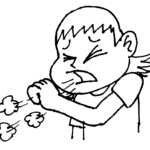Vitamin B12 and unexplained cough
 During the World Allergy Congress, researchers from the University of Turin, in Italy reported that a “deficiency of vitamin B12 might be a factor in unexplained chronic cough and dysfunction of the pharynx and larynx.”
During the World Allergy Congress, researchers from the University of Turin, in Italy reported that a “deficiency of vitamin B12 might be a factor in unexplained chronic cough and dysfunction of the pharynx and larynx.”
First, the details.
- 40 patients with chronic cough underwent a series of tests to assess their cough.
- Of these, 25 were found to have vitamin B12 deficiency (blood levels less than 300 pg/mL)
- They were compared to 15 chronic-cough patients with no detected nutritional deficiency.
And, the results.
- Patients with vitamin B12 deficiency had significantly lower thresholds for stimulating the extrathoracic airway and cough, but similar bronchial stimulatory threshold vs the group with normal vitamin B12 levels.
- FeNO (a measure in inflammation) was in the normal range in both groups.
- Patients with lower vitamin B12 levels had significantly higher NGF scores vs controls.
- NGF (nerve growth factor) is a protein that affects the growth and maintenance of nerve cells.
- After vitamin B12 treatment, the level at which the patients had a histamine reaction improved significantly only in patients with vitamin deficiency vs no significant change was observed in control subjects.
The bottom line?
The authors concluded that in vitamin B12 deficiency there are changes that favor nerve inflammation, “leading to chronic cough and airway dysfunction.”
A couple of months ago, researchers from Harvard School of Public Health, in Boston reported the results of a school snack program in Bogota, Columbia in which children received snacks containing 30% and 50% of their daily requirements of energy and iron, respectively.
After 3 months, those getting the snack had significantly greater increases in vitamin B-12 blood levels. And this was accompanied by fewer days with symptoms (eg, cough with fever, diarrhea with vomiting), 44% fewer doctor visits, and 23% fewer days of school absenteeism.
12/15/09 20:33 JR